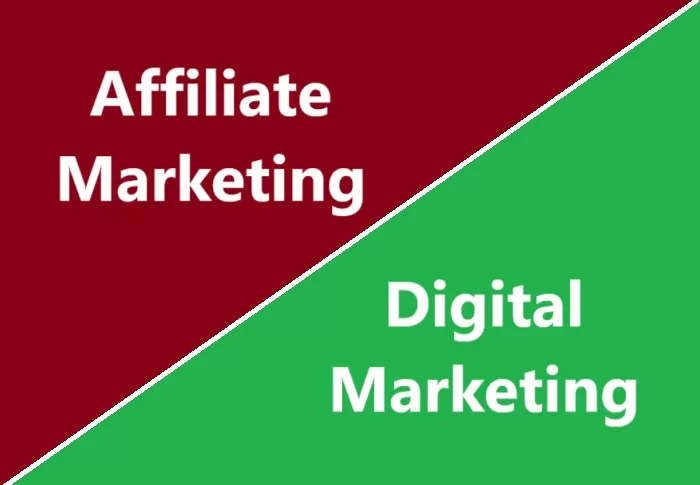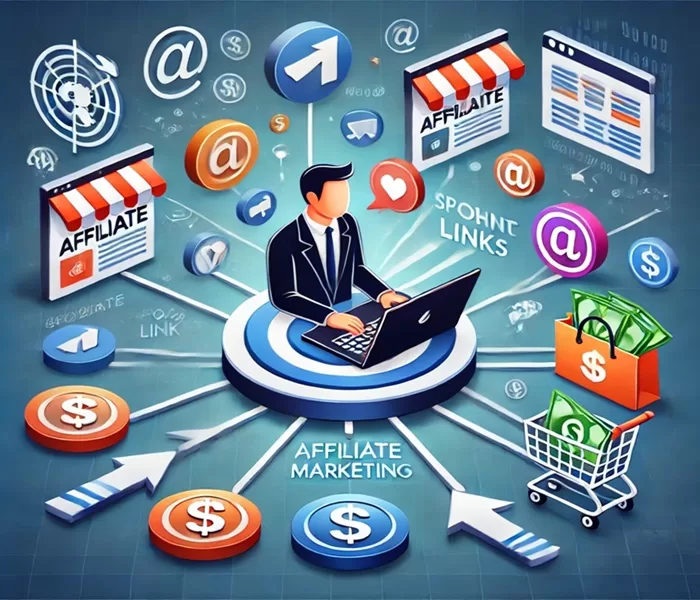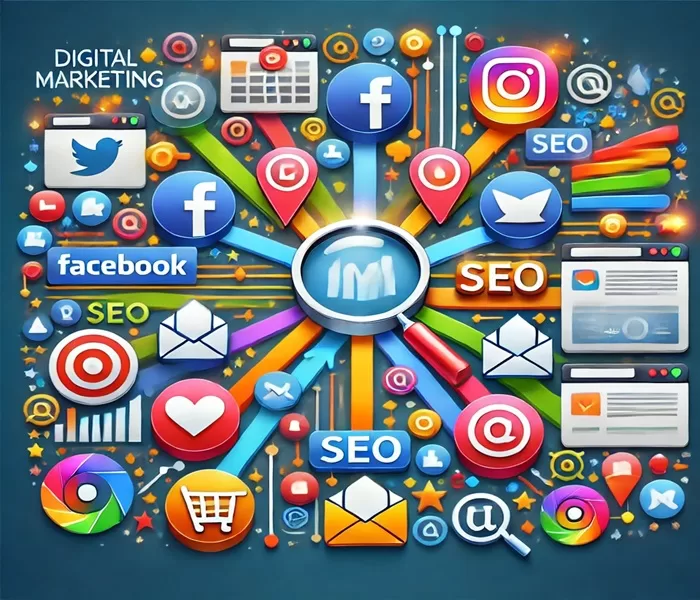
Online marketing can be challenging for beginners to understand the various strategies for building an online business. In this article, we discuss the two most popular methods – affiliate marketing vs digital marketing. Both fall under online marketing, but they differ in execution, scope, and target audience.
Let’s clarify the differences to help beginners determine which method better suits their goals, skills, and resources.
Affiliate Marketing vs. Digital Marketing
First let’s learn about affiliate marketing and digital marketing separately, then understand the differences between the two.
What is Affiliate Marketing?
Definition
Affiliate marketing is a performance-based marketing strategy where an individual (affiliate) promotes someone else’s (merchant) product or service to a targeted audience and earns a commission for each sale or conversion. The merchant provides unique affiliate links to track traffic and sales of the promotion efforts. These links allow the merchant to measure the success of their marketing campaigns and the affiliate earns commissions for driving traffic or sales.
How It Works
Affiliate marketing involves three key players: the product owner (also called the merchant), the affiliate (the promoter), and the consumer. Here’s how it works:
- The Affiliate Signs Up for an Affiliate Program: Many companies, like Amazon (through Amazon Associates) offer their affiliate programs. Affiliates can sign up for the programs, choose from a range of products or services, and get unique affiliate links to promote those products.
- Affiliate Promotes Products: Affiliates promote products through various digital channels such as blogs, social media, or email marketing. The goal is to drive traffic to the merchant’s website through their affiliate links.
- Affiliate Earns Commissions: When someone clicks on the affiliate link and buys a product, the affiliate earns a commission set by the merchant.
For example, Amazon is a popular online retailer. They have an affiliate program called Amazon Associates. You (affiliate) can join their program, get affiliate links of the products you want to promote and promote the links through your blog, social media posts, and email marketing campaigns. To get more sales, you use many marketing strategies, including content marketing, search engine optimization, and pay-per-click (PPC) marketing. The more you can sell or convert, the more you can earn.
Examples of Popular Affiliate Programs
- Amazon Associates: One of the most popular affiliate programs. Affiliates earn commissions by promoting any products available on Amazon’s site.
- Commission Junction (CJ): Another popular affiliate network offering products and services from top brands and companies in multiple industries.
- ShareASale: An affiliate network with a wide range of merchants and products on various commission structures and payment methods.
What is Digital Marketing?
Definition
Digital marketing includes all marketing efforts using digital channels, such as websites, search engines, email, and social media, to promote products or services. Its primary goal is to reach and engage with a targeted audience, drive traffic, and increase sales or conversions. Unlike affiliate marketing, digital marketing involves the direct promotion of a company or individual’s own products or services.
Key Components of Digital Marketing
- Search Engine Optimization (SEO): Optimization of website content to rank higher on search engine results pages to drive organic (non-paid) traffic.
- Pay Per Click (PPC) Campaigns: Paid advertising through Google Ads or social media ads.
- Social Media Marketing: Using social media platforms like Facebook, Instagram, and LinkedIn to promote content, build brand awareness, and engage with potential customers.
- Content Marketing: Creating and distributing valuable content (blogs, videos, infographics) to drive traffic and sales.
- Email Marketing: Building email lists and running email campaigns.
For example, you can start an e-commerce website like Amazon. You have to invest in inventories, manage your content, use various marketing strategies, find affiliates to promote products, respond to customer queries, manage orders, and everything on your own. You can hire experienced people to do some of your work.
How Digital Marketing Differs from Affiliate Marketing
The major difference between affiliate marketing and digital marketing is in their scope. While affiliate marketing involves promoting someone else’s product or service to earn a commission, digital marketing involves strategies to promote a company’s own product or service. Affiliates act as middlemen, while digital marketers often use full control over their brand-building, advertising, and customer relationship strategies.
Key Differences: Affiliate Marketing vs Digital Marketing
| Aspect | Affiliate Marketing | Digital Marketing |
|---|---|---|
| Focus | Focuses on promoting other people’s products or services through affiliate links. | Focuses on promoting their products or services using various online marketing strategies. |
| Revenue Model | Affiliates earn commissions for each sale or lead generated using their marketing techniques. | Digital marketers have various revenue models, such as direct product sales, paid subscriptions, or pay-per-click (PPC) campaigns. They can also earn revenues from advertising or sponsorships. |
| Control | Affiliates cannot change the pricing, product features, or branding as they want. | Marketers have full control over how they want to run their campaigns, product pricing, branding, and customer relationships. |
| Risk | Affiliates involve minimal financial risk, as they don’t need the upfront investment for products and order delivery to customers. | Marketers need financial investment in marketing tools, content creation, and paid advertising, which can lead to higher risk. |
Which is Better for Beginners?
Beginners need to understand these pros and cons of affiliate marketing and digital marketing:
Pros and Cons of Affiliate Marketing for Beginners
Pros:
- Low startup cost: No need to create a product or invest in inventory.
- Customer service: No responsibility for shipping, returns, and customer inquiries.
- Scalable: As your audience grows, so your earnings increase.
Cons:
- Limited control: No control over product quality and service.
- Competitive: Affiliates can face high competition for online visibility.
- Delayed earnings: Payments are typically received on the merchant’s scheduled date.
Pros and Cons of Digital Marketing for Beginners
Pros:
- Full control: You have complete control in creating and promoting your products and services, pricing, and managing your brand’s image.
- Diversified revenues: You can make money through product sales, advertising, services, and more.
- Long-term brand building: You can build a permanent and strong brand, customer loyalty, and authority in your industry.
Cons:
- Upfront cost: Investment in tools, content creation, advertising campaigns, and anything to keep running and growing your business.
- Steeper learning curve: Several digital marketing skills for SEO, PPC, and email marketing.
- Ongoing effort: Your continuous efforts to create content, optimize campaigns, and engage with your target audience.
Factors to Consider When Choosing Between the Two
When deciding which is better for you, answer the following questions:
- Interests: Do you want to promote other people’s products or build your own brand?
- Skills: Are you comfortable with learning and managing digital marketing strategies, or would you focus on creating content to promote products as an affiliate?
- Resources: Do you have the budget for digital marketing campaigns, or are you looking for low-cost and low-risk marketing?
Your answers will decide for yourself.
How to Get Started with Affiliate Marketing
If you choose affiliate marketing, you will need these:
- Find Affiliate Programs: Look for well-known, popular affiliate programs that align with your niche or interests. Here is a list of the best affiliate programs.
- Build a Website or Blog: Start your platform to share content and promote affiliate products based on a profitable niche.
- Create High-Quality Content: Content is key to affiliate success. Write valuable reviews, tutorials, and comparisons for your target audience.
- Promote Affiliate Products: Use social media marketing, email marketing, and SEO strategies to drive traffic to your content with affiliate links.
- Track Performance: It is important to analyze your affiliate dashboards and use tools like Google Analytics to track clicks, conversions, and earnings. It will help you improve your marketing performance.
Though looks simple and easy, affiliate marketing is hard to succeed without the correct wisdom and approach. So, for in-depth knowledge and practical techniques, read these books and courses from experts:
| Best affiliate marketing books
| Top courses on affiliate marketing
How to Get Started with Digital Marketing
If you choose digital marketing, the following are essentials:
- Set Goals and Objectives: Clear your goals by identifying how to drive traffic, increase sales, or build brand awareness.
- Create a Marketing Plan: Outline the strategies you will use (SEO, PPC campaigns, and social media marketing) to help you achieve the objectives.
- Learn Basic Marketing Skills: Take some courses or guides to learn skills like SEO, content marketing, and social media advertising.
- Implement Marketing Strategies: Launch your campaigns, optimize content for search engines, and use multiple channels to reach your audience.
- Measure and Analyze Results: Track key performance indicators (KPIs) using analytics tools to measure your success and improve your campaigns.
If applied the right, innovative strategies, digital marketing can be a highly profitable business. Learn valuable tips and tricks fromthese books and courses:
FAQs
Is digital marketing the same as affiliate marketing?
No, affiliate marketing is a specific type of performance-based marketing where you promote someone else’s product for a commission. However digital marketing refers to strategies of promoting a brand’s own product or service.
How to increase affiliate marketing sales?
You can increase sales by creating high-quality, targeted content, and promoting products based on your audience’s needs. You should also implement SEO and social media marketing strategies.
When did affiliate marketing start?
Affiliate marketing began in the mid-1990s with the rise of the Internet. We can mention CDNow (a shopping site), which launched its affiliate program in 1994. Then, in 1996, Amazon introduced its Associates Program, revolutionizing the concept by enabling affiliates to earn commissions on sales generated through their referrals. This marked a significant milestone that it has evolved into a multibillion-dollar industry today. (Source)
Will affiliate marketing die?
No, no one believes affiliate marketing is likely to die. We see it continues to grow and adapt to changing market conditions. Experts predict that the industry will continue to thrive due to these factors (Source):
- Increased Trust: Consumers trust influencers and affiliate marketing as they recognize its value.
- Technological Advancements: AI and machine learning can enhance targeting and personalization in affiliate marketing campaigns.
- Diverse Platforms: New platforms like TikTok are becoming as significant contributors in the affiliate space, attracting younger audiences and changing shopping behaviors.
- Future Outlook: While there are challenges, the outlook for affiliate marketing remains positive.
Why Is Affiliate Marketing So Popular?
Affiliate marketing has gained due to these reasons:
- Cost-Effectiveness: Companies only pay affiliates when they achieve desired sales or leads, making it a low-risk investment.
- Flexibility for Affiliates: Affiliates can work with greater freedom in promoting products.
- Targeted Audience Reach: Brands can select affiliates who align closely with their target demographics, ensuring more effective marketing.
- Proven Success: The industry has demonstrated significant growth, with U.S. spending on affiliate marketing increasing from $5.4 billion in 2017 to $8.2 billion in 2022 (Source). This trend indicates the effectiveness of this strategy.
Affiliate marketing and digital marketing are kinds of opportunities for making money online. Affiliate marketing is a low-cost, low-risk option to earn commissions by promoting products. On the other hand, digital marketing is a more controlled option but requires a higher investment of time and resources.
For beginners, the choice between the two depends on personal interests, skills, and resources. Both can be profitable if approached with the right strategies. So read more and discuss with experienced people to know which works best for you.
Are you happy reading the article? If so, please share this page with your friends and social media posts to show your support for my work.
Disclosure: We are partners or associates of Amazon and other top brands. We may earn a small amount from qualifying purchases without increasing the price. Please read our full affiliate disclosure here.
Ibochouba Singh is a content writer and reviewer with a passion for writing about digital marketing and tech gadgets, including software tools and new tech gadgets. He has over 15 years of experience writing for several consumers and clients, including tech startups, marketing agencies, and software companies. He is writing many articles and product reviews for many websites, including nigcworld.com, buywin.in, medium.com, and quora.com.



